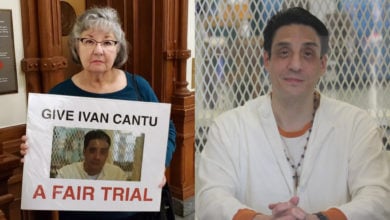Since Oct. 7, the Israeli government and its supporters in the West have raised a giant outcry over some 200 Israelis now held in Gaza. Their pictures are in the media, their loved ones are interviewed. In marked contrast, nothing is said about the 10,000 Palestinians held hostage by Israel in its jails. There are no pictures. No one interviews their relatives on how much they are missed.
Nor is it discussed that the Resistance’s stated goal of taking Israeli hostages was to exchange them for Palestinian prisoners. This means that the quickest way to get the release of 200 or so Israelis held in Gaza would be to agree to exchange them for Palestinian prisoners. But this is not being considered as an option. Instead, the Resistance is villified for taking hostages, and the indiscriminate bombing of Gaza continues, a collective punishment that has killed more than 7,000 Palestinians so far .
Nor has it reported that since Oct. 7 Israel doubled the number of Palestinian held in custody to 10,000. Among them and 170 are children. The Israeli Defense Force has has also arrested some 4,000 laborers from Gaza and unlawfully detained them. Another 1,070 Palestinians were taken captive in overnight raids in the West Bank and East Jerusalem.
Mass incarceration of Palestinians
Mass incarceration, repeated arrests and poor treatment of Palestinians in Israeli jails has long been an issue of huge concern to Palestinian families. Two-in-every-five Palestinian men have been arrested and charged. Each year approximately 500-700 Palestinian children, some as young as 12 years old, are detained and prosecuted in the Israeli military court system.
Israel’s military court system and its carceral approach has been described as the “institutional centerpiece of occupation” and a tactic to silence anti-colonial resistance. Palestinians are arrested for expressing opinions, political speeches. Anywhere else in the world children would be considered heroic for throwing rocks at tanks. Here, they are arrested.
Palestinians are considered guilty without evidence, arrested without warrants and interrogated for 90 days while withholding legal counsel for 60 days. Israel routinely suspends civil rights by classifying prisoners as “unlawful combatants” holding prisoners indefinitely without judicial review regardless. This is similar to the U.S.’s classification of Guantanamo Bay prisoners are “enemy combatants,” allowing the U.S. to suspend their legal rights.
Now, prisoner rights organizations in Palestine have raised alarm around the intensification of the already brutal mistreatment of Palestinian prisoners since Oct. 7, and have decried the International Red Cross’ silence on the major acceleration of incarceration and abuse. Prisoners are being denied access to courtyards, legal counsel or even family visits.
Groups report that prisoners are subjected to daily severe beatings, intimidations and raids, that prison authorities have closed down the food stores, and that prisoners are being limited to two meals a day, with decreased portions.
‘Systematic assassination operation against prisoners’
The Palestinian Detainees and Ex-Detainees Affairs Commission described this escalation by the Zionist occupation as “a systematic assassination operation against prisoners…amid a total aggression campaign against our people.” In the last two days two prisoners, 58 year old Sheikh Omar Daraghmeh and 25 year old Arafat Hamdan, died under suspicious circumstances two weeks after their arrest, which the Resistance News Network attributes to severe torture by the Israeli regime.
The head of the Palestinian Authority’s Commission for Detainees’ Affairs Qadura Fares, calls these recent developments regarding prisoners “unprecedented” and “dangerous.”
“Prisoners are subjected to starvation and thirst; they are prevented from accessing their medicine, specifically for those suffering from chronic illnesses that require regular medication,” he told Al Jazeera, adding that matters became worse “when the prison administration cut off water and electricity”.
Addameer also reported the prevention of access to medical care. “They also shut down the prison clinics, and also prevented prisoners from going to hospitals and external clinics, despite the presence of some cancer patients among the prisoners who require continuous treatment.
Fares said that “the most dangerous thing” over the past few days was “physical attacks” and degrading treatment. “Everyone who is arrested is assaulted.” He continued,“Many of the prisoners have had their limbs, hands and legs broken … degrading and insulting expressions, insults, cursing, tying them with handcuffs to the back and tightening them at the end to the point of causing severe pain … naked, humiliating and group search of the prisoners.”
This inhumane treatment and the violation of the Geneva Conventions stands in stark contrast to what is know so far about how Israeli hostages have been treated. In the last two weeks, released Israeli hostages have testified to humane treatment, adequate food and sanitary conditions.
800,000 arrested since 1967
Since 1967, over 800,000 Palestinians, including children as young as 12, have been arrested and detained. Israel’s use of administrative detention to hold Palestinians without charge for any “future” offense they might commit speaks to the all-consuming control it has over Palestinians’ day to day lives.
Francesca Albanese, UN Special Rapporteur, said earlier this year that “Israel’s unlawful carceral practices were tantamount to international crimes which warranted an urgent investigation by the Prosecutor of the International Criminal Court.” The abuses continue. Earlier this year the far-right Knesset passed a bill limiting medical care for prisoners claiming the healthcare access is too “lenient.” The Knesset also considered enacting the death penalty for Palestinian resistance, a move even condemned even by Israel’s European allies as excessive and inhumane
As resistance continues, freeing all political prisoners remains a critical element of the liberation of Palestine as a whole. Free all political prisoners!





